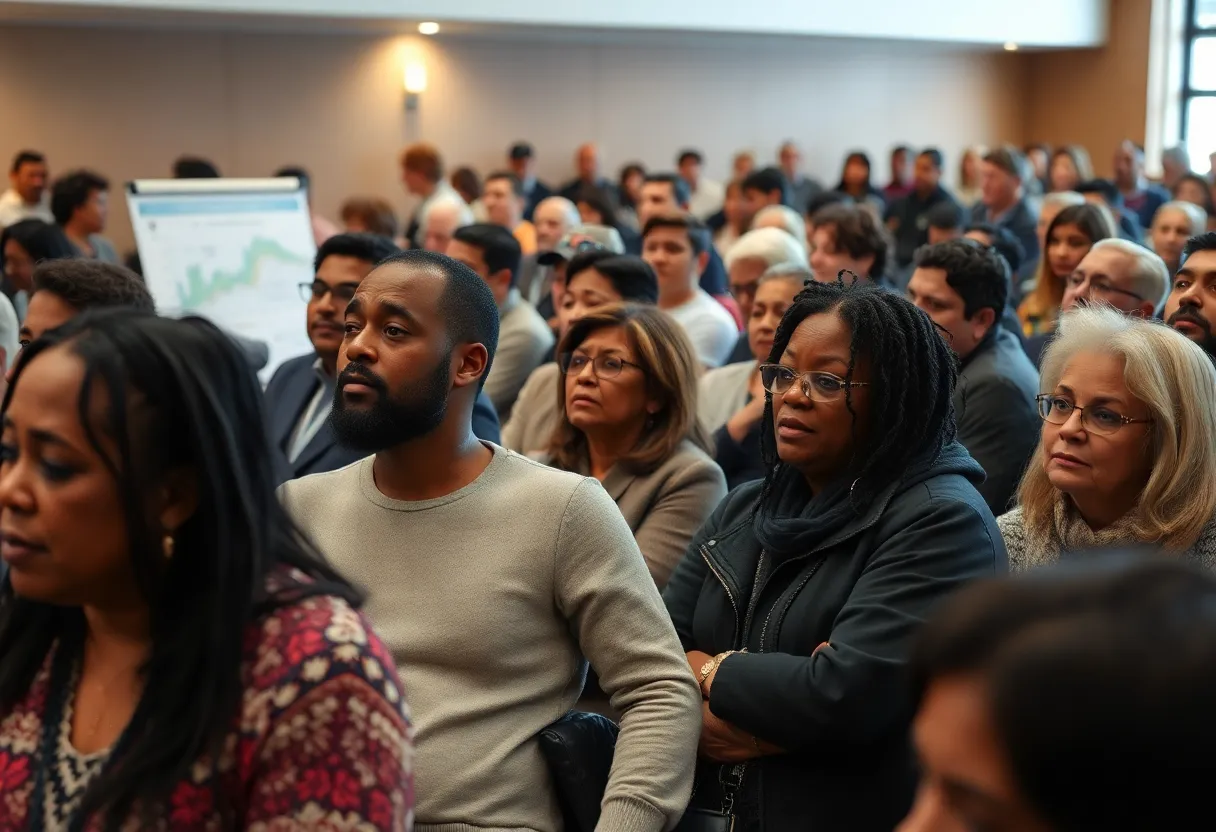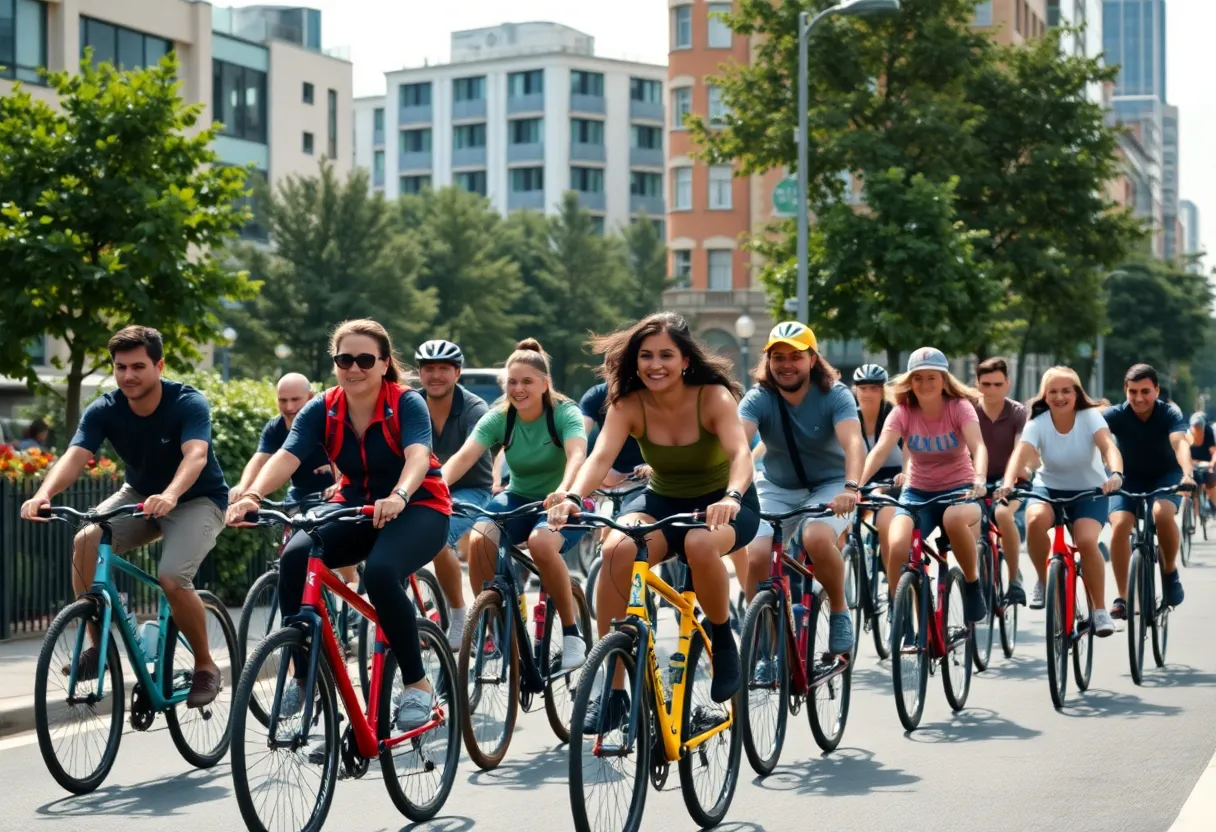Louisville, October 22, 2025
During a recent town hall in Shawnee, Louisville residents raised significant concerns regarding the I-65 corridor expansion. Over 200 residents attended to express worries about traffic, environmental impacts, and potential displacement due to the proposed widening of lanes by the Kentucky Transportation Cabinet. The meeting highlighted community desires for more inclusive planning discussions, as officials promised additional consultations to address these concerns, emphasizing a need for balance between infrastructure development and local quality of life.
Louisville Residents Voice Concerns Over I-65 Corridor Expansion at Town Hall
Louisville — In a recent town hall meeting in the Shawnee neighborhood, local residents expressed significant worries about the proposed expansion of the I-65 corridor. Over 200 attendees highlighted potential traffic impacts and environmental risks, with fears of displacement taking center stage.
The meeting focused on the Kentucky Transportation Cabinet’s (KYTC) plans to widen lanes along the corridor to alleviate congestion. However, residents pushed back against these proposals due to concerns about increased noise pollution and the loss of green spaces. This opposition underscores the community’s desire for developments that prioritize their quality of life.
KYTC officials presented details of the project, emphasizing its benefits for traffic flow in the area. Despite this, the gathering revealed deep-seated tensions, as participants called for more inclusive planning processes to ensure their voices are heard in future decisions.
The event concluded with officials committing to additional consultations, signaling an ongoing dialogue in Louisville’s urban development efforts.
Key Issues Raised by Residents
Attendees at the town hall delved into specific aspects of the I-65 expansion. Many pointed out that widened lanes could exacerbate traffic problems rather than solve them, potentially leading to more congestion during peak hours. Environmental risks were a major topic, with discussions centering on how the project might disrupt local ecosystems and contribute to noise pollution.
Furthermore, the fear of displacement was prominent, as residents worried that the expansion could affect homes and businesses in the Shawnee area. This concern stems from the scale of the project, which involves significant infrastructure changes that could alter the neighborhood’s landscape.
Community members advocated for alternatives that minimize these impacts, suggesting that any plans should incorporate resident input from the outset. This push for inclusivity reflects broader challenges in balancing infrastructure needs with community preservation.
Background on the I-65 Corridor Project
The I-65 corridor expansion is part of ongoing efforts to improve transportation in Louisville, a city known for its growing traffic demands. The KYTC aims to address congestion issues by expanding lanes, which officials argue will enhance safety and efficiency for daily commuters. However, such projects often come with trade-offs, including potential environmental degradation and community disruptions.
Historically, urban development in Louisville has involved similar initiatives, where infrastructure upgrades are weighed against their effects on local residents. The Shawnee neighborhood, with its vibrant community, has seen various development projects over the years, highlighting the need for careful planning to maintain its character.
This town hall is not an isolated event; it represents a pattern of public engagements where stakeholders discuss the implications of large-scale projects. By committing to further consultations, KYTC officials are attempting to bridge the gap between project goals and community expectations, fostering a more collaborative approach to urban growth.
The meeting’s emphasis on environmental risks and traffic impacts illustrates the complexities of modern infrastructure projects. Residents’ calls for inclusive planning underscore the importance of transparency and community involvement in decisions that affect daily life. As Louisville continues to evolve, events like this one play a crucial role in shaping policies that benefit all parties involved.
Expanding on the residents’ concerns, the potential for green space loss was a key point of discussion. Attendees noted that the project could lead to the removal of trees and parks, which are vital for recreation and environmental health in urban areas like Shawnee. Noise pollution from increased traffic was another focal point, with fears that it could negatively affect health and property values.
Officials from KYTC outlined the project’s benefits, such as reduced travel times and improved economic connectivity. Yet, the strong pushback indicates that these advantages must be balanced against the drawbacks. The commitment to further consultations suggests that revisions to the plan may be considered, potentially incorporating community-suggested mitigations.
In the broader context, this event highlights ongoing debates in cities across the region about sustainable development. Louisville’s approach to the I-65 expansion could serve as a model for how to integrate public feedback into infrastructure projects, ensuring that growth is both efficient and equitable.
To provide more depth, the town hall attracted over 200 people, demonstrating high community engagement. This level of participation is indicative of the project’s significance to the local population. By addressing these concerns head-on, stakeholders hope to reach a resolution that minimizes negative impacts while achieving the project’s objectives.
As discussions continue, the focus will remain on creating plans that not only ease congestion but also protect the environment and preserve community spaces. This event marks a pivotal moment in Louisville’s urban planning narrative, emphasizing the need for balanced development strategies.
Supporting Details and Community Response
During the meeting, residents actively questioned the project’s details, seeking clarifications on how it would affect their daily lives. The push for more inclusive planning was evident, with attendees stressing the importance of early involvement in decision-making processes. This response from the community reflects a growing awareness of the need to safeguard neighborhoods from unchecked development.
KYTC’s outline of the expansion plans included specifics on lane widening and congestion relief, but the feedback centered on potential downsides. The meeting’s end with a pledge for more talks indicates a willingness to adapt, potentially leading to modified proposals that address resident feedback.
Overall, the town hall in Louisville’s Shawnee neighborhood brought to light the challenges of urban expansion, setting the stage for future collaborations between officials and the community.
FAQ Section
- Q1: What were the main concerns raised by residents at the town hall in Louisville’s Shawnee neighborhood?
- Q2: What plans did KYTC officials outline at the meeting?
- Q3: What pushback did KYTC officials face?
- Q4: What did community members demand?
- Q5: How did the meeting conclude?
A1: Residents voiced strong concerns over the proposed I-65 corridor expansion, questioning traffic impacts and environmental risks, fearing displacement.
A2: KYTC officials outlined plans for widened lanes to ease congestion.
A3: KYTC officials faced pushback on noise pollution and green space loss.
A4: Community activist Lila Grant demanded more inclusive planning, calling for resident input.
A5: The meeting ended with a commitment to further consultations, highlighting tensions in urban development.
Key Features Chart
Below is a simple table summarizing the key features of the I-65 corridor expansion concerns discussed at the town hall:
| Feature | Description |
|---|---|
| Traffic Impacts | Residents questioned potential increases in congestion despite plans for widened lanes. |
| Environmental Risks | Concerns included noise pollution and loss of green spaces. |
| Displacement Fears | Attendees feared the project could lead to relocation of residents. |
| Inclusive Planning | Demand for more resident input in the planning process. |
| Outcome | Commitment to further consultations to address tensions. |
Deeper Dive: News & Info About This Topic
HERE Resources
Concerns Raised Over I-65 Corridor Project in Louisville
Kentucky’s Speed Enforcement Cameras Successfully Reduce Speeding
Louisville Man Dies After I-65 Semi-Truck Crash
Government Shutdown Delays Military Pay and Strains Food Aid in Louisville
Louisville Business Association Spotlights Economic Initiatives
Serious Crash Shuts Down I-65 North Near Shepherdsville, Kentucky
WHAS11 Expands Local News with New Daily Newscasts





